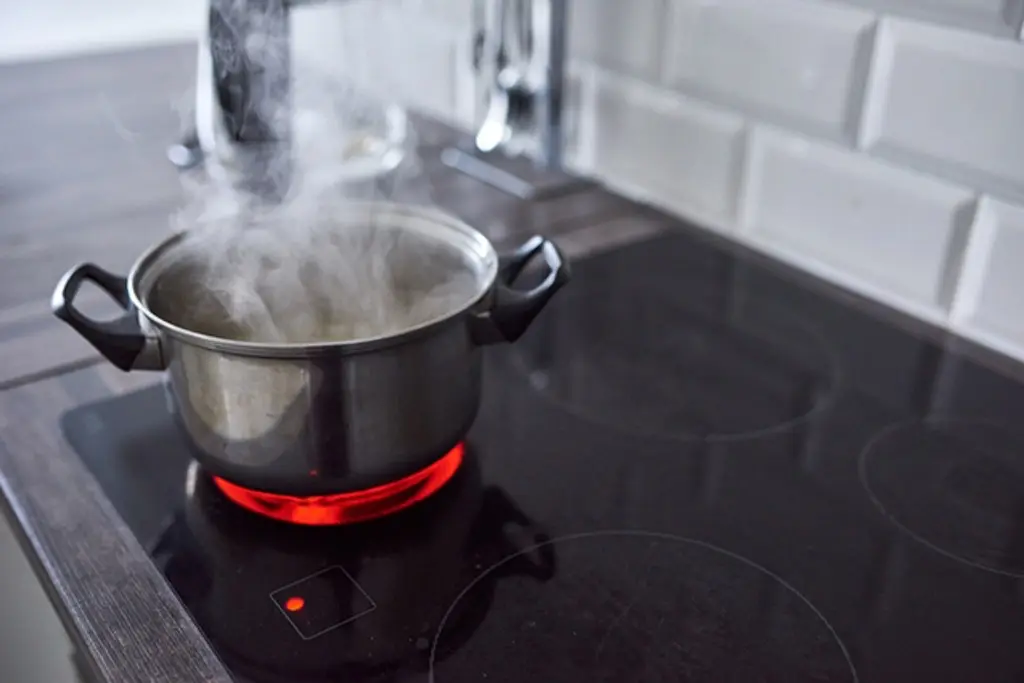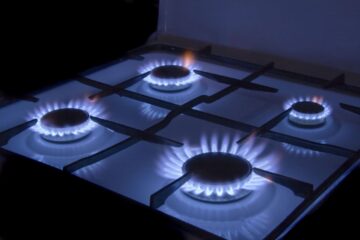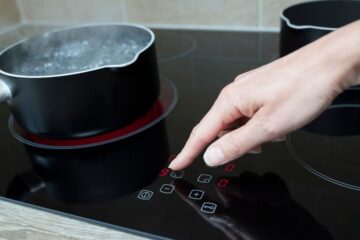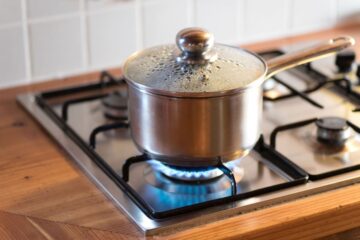When you turn on your electric stove, does it make a popping sound? This can be alarming, but there are some prevalent reasons why your stove makes this popping sound, many of which are harmless. Here’s what you need to know about electric stove popping sounds and how to handle them in the best way possible.
Electric Stove Popping Sound (Top 14 Reasons Why)
There are several reasons why this happens:
1. Improper Heating
The reason for this popping sound is that the heating element is not at the correct temperature. If the heaters are too hot, then they will burn out quickly. This can cause a popping sound when you try to start the stove and it does not work, or if you try to cook something on it and it does not work correctly. The best way to avoid this is to check your stove’s settings before using it and keep an eye on how much time passes between each cooking session.
2. Ignitor Problem
The most common reason for the electric stove popping sound is that the ignitor is not working. The ignitor is a small piece of metal that generates heat and sparks when you turn on the stove. If no heat comes out of it, it will not be able to light up your stove. This can often be fixed by simply cleaning it with a damp cloth or replacing it with a new one.
3. Incorrect Cleaning
If you often use your stove and leave it dirty, it will likely be full of dust and dirt, which will cause the fire to pop out. This is because the dust and dirt can reduce the temperature of the gas, so it will create a higher pressure on the fuel tank, resulting in an explosion.
4. Fluctuations In The Power Supply
If your power supply fluctuates significantly, it could cause the stove to pop loudly. This is because the electric current in the circuit is not constant but varies from time to time due to fluctuations in the electric supply.
5. Moisture Accumulation
The moisture accumulates in the cracks and crevices of the electric stove, which is why you will hear popping sounds when you turn on or off your electric stove. The moisture can also accumulate in areas that don’t get much direct sunlight, so if you have a cold spot in your kitchen where there isn’t any direct sunlight, this may be what causes the problem.
6. Presence Of Liquid Elements
The presence of liquid elements in the combustion chamber is one of the most common causes of popping sounds. The liquid elements include water, oil, and other types of liquids in the combustion chamber. These liquid elements can be eliminated by using a vent pipe or replacing the burner with a new one.
7. The Door Is Not Properly Closed
Left open doors can cause noise and other problems, such as carbon monoxide poisoning from a leaky chimney flue pipe or ductwork. If this is the case, you’ll want to ensure that your door is closed securely before turning on your stovetop again.
8. The Knobs Are Not Properly Adjusted
One of the most common causes of a popping sound is the wrong adjustment on the knobs. The knobs are adjusted to give you constant heat, which is what your stove is meant to do. If you have changed your settings, then there will be a change in the consistency of your hot water or steam. This can cause problems with the stove’s operation.
9. The Timer Is Set To Bake Instead Of Cook
The most common reason for the popping sound is that the timer is set to bake instead of cook. This can be easily fixed by checking whether your oven has a bake/cook button. If it does, push that button instead.
If unsure, try setting the timer to cook rather than bake. This way, you’ll have a chance to check whether you’re baking or not before turning on your gas stove again.
10. Expansion Of Electric Stove Parts
Electric stove parts expand and contract as they heat up and cool down. The stove’s heating results from an electrical current running through it, which develops the metal parts and distributes heat evenly inside the stove. When you turn off your electric stove, this expansion stops and contracts again, resulting in a popping sound or hissing sound from some of your electric stove parts when you turn on your electric stove again.
11. The Burner May Be Too Hot
The burner is too hot, and the stove is popping, so the heat is too high. You need to turn down the temperature on your electric stove or turn off the burner. If you don’t know how to do that, it’s best to call an electrician because they will be able to fix it right away.
12. The Burner May Be Too Low
The burner is too low, and the stove is popping, which means the heat is too low. You need to turn the temperature on your electric stove or turn the burner. If you don’t know how to do that, it’s best to call an electrician because they will be able to fix it right away.
13. Corrosion
Corrosion can also be a reason for this problem. Suppose there are any cracks or crevices in your electric stove. In that case, they could be able to collect moisture and cause it to build up over time, leading to popping sounds when you turn on or off your electric stove.
14. Age of Electric Stove
The age of your electric stove can also cause it to pop when turned on or off. Suppose there are any cracks or crevices in your electric stove. In that case, they may be able to collect moisture and cause it to build up over time, which will eventually lead to popping sounds when you turn on or off your electric stove.
How To Fix Electric Stove Popping Sound?
Most of the time, the burning smell is caused by a faulty heating element.
Here are a few things you can try:
1. Open all the exhaust and supply vents.
2. Turn on the fan if you have one in the kitchen.
3. Try cleaning the heating elements using a small amount of cooking oil.
4. Replace the heating elements.
5. Replace the thermostat. 6. Replace the cooktop. Note that this may not be your problem but it’s worth trying.
Related Queries
Electric Stove Clicking Sound
Have you ever stopped to wonder why your stove clicks?
The reason is simple. It’s so that you know it’s turned on, and it’s just a sound that we’re all used to hearing when we hear our stoves clicking in the morning.
But what does this mean for your home?
The most important thing about an electric stove is that it prevents sparks from flying. Suppose you’ve ever heard a spark from an electric stove. In that case, you know how dangerous it can be—and if you’ve ever had a spark fly up into your ceiling or onto your pets or yourself (or even worse), then you know how much damage it can do.
So how does this sound?
A click means that your stove has been turned on and is ready for cooking. It also means that electricity will flow through your kitchen, so there won’t be any sparks flying around and causing accidents.
The click is also a way to let people know when to turn off the oven light, so they don’t accidentally hit something while trying to open the oven door or something like that!
Electric Stove Clicking Sound When Off
Electric stoves can be a significant pain to maintain. If you have an electric stove, you know how loud it is when the burner turns off. It’s annoying. Well, now there’s something you can do about it!
A lubrication system causes the clicking sound of some electric stoves when they turn off the heating element—and it’s not a safety feature! It’s there so that when the element gets too hot and no longer conducts electricity, it will click loudly to let you know that something has gone wrong with your appliance.
To fix this problem, remove the burnt-out element from your stove and replace it with one that does not make this clicking noise. This will stop the clicking sound from happening again!
Why Is My Electric Oven Making A Popping Noise?
Electric Oven Popping Sound
Popping noises is one of the most common problems you’ll encounter with an electric oven. It’s so common that we’re going to go ahead and give you a quick rundown on what’s causing it—and how to fix it.
When an electric oven makes a popping noise, it’s probably because there is something wrong with the heating element or thermostat. The popping could be caused by the heating element itself burning out and causing an electrical fire. It could also be caused by a lousy thermostat not turning off when it should.
This happens because these components are located in different areas of the oven, so they’re not getting enough contact to work correctly. If this happens, then they will overheat and start making popping noises due to overheating.
To fix this problem:
If your electric oven is making a popping noise, there are a couple of things you can do to fix it.
First, check the bottom of your oven. If you see any metal on the bottom of your oven that looks rusted or corroded, this could be causing the noise. You might also have some rust on the inside of your oven. If so, clean it off with some steel wool and vinegar until you’re sure it’s gone.
If none of these things are causing your popping noise, try shaking your oven upside down and listen for any rattling or scraping sounds. If noises like that come from inside your oven when it’s upside down, then this is probably what’s causing the popping noise!
Oven Making Clicking Noise When Preheating
If you’re hearing a clicking noise when your oven is preheating, it’s probably because you’ve got something stuck in the fan.
The clicking noise is a warning that your oven will soon be too hot to touch, so if you’ve ever had an oven that heated up too quickly, this may be the problem.
If the clicking continues after you take out whatever is causing it. In that case, you should contact a professional to have it fixed.
Is A Clicking Stove Dangerous?
A clicking stove isn’t dangerous.
It’s very safe and can be used safely by everyone.
It is so safe because the gears inside the stove are made up of materials that aren’t flammable.
It’s also important to note that if you use a clicker stove, you don’t have to worry about getting burned or hurt.
You will only get scalded if you wear loose clothes and accidentally bump into the stove while moving around in your kitchen area.
Why Does My Electric Stove Keep Clicking?
If your stove is constantly clicking, you might be experiencing a problem with your electric stove.
The clicking you hear when your stove is working might indicate that your stove has failed in its attempt to heat a burner. If this happens frequently and you notice that the food being cooked on the burner does not come to a temperature, this could be a sign of a problem.
Why Is My Microwave Making A Popping Noise?
Microwave Making Electrical Popping Noise
Microwaves are a great way to cook food quickly but can also be noisy. If you hear a popping sound in the microwave, it’s probably just the sound of popcorn kernels popping.
When popcorn cooks in a microwave, it is heated by an electromagnetic field produced by the magnetron (the device that generates microwaves) inside the microwave oven. The magnetron produces wavelengths of energy about one-half inch long and five inches wide—the size of human hands! The magnetron sends this energy into the metal tube that conducts electricity from your power source to your microwave oven.
Popcorn kernels in your microwave oven will heat up quickly because they’re small and have a lot of surface area compared with other foods. This means more heat gets transferred inside the kernel to outside surfaces than from inside to outside. As a result, some of the kernels will begin to vibrate and make noise as they heat up. The vibrations cause air molecules around these kernels to bounce violently against each other and create noise.
The Final Words
We’re glad you made it to the bottom of this blog! We had a lot of fun writing it and found it to be a fascinating topic to investigate. As we said from the beginning, there are many reasons why an electric stove can make popping sounds. In fact, the more we looked into this, the more reasons we found!
First, we looked at why a stove might be making a popping sound when in use. We then discussed how to fix the popping sound, including what you might try if the popping sound results from the stove being dirty.
Finally, we looked at how you could prevent the popping sound from happening in the first place. We hope you enjoyed reading this blog and that you can put these tips to good use in your own home!



